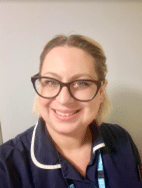How Can Nurses Get Involved in Local Research Initiatives?
19 March 2024 | Donna Clements and Joanne Moore

Donna Clements, NIHR Clinical Research Nurse, Norfolk Community Health and Care NHS Trust
In 2007, around 6 months after becoming a registered nurse, I started coordinating an international drug study with a consultant neurologist at our hospital. This was my first lesson in systematically collecting clinical data. I realised that one day that evidence would be in the British National Formulary. After completing a MSc in Clinical Research, I moved into Primary and Community Care research delivery in 2017. I am a NIHR Senior Research Leader (2023-2026) and sit on the national Working Group for the Community Healthcare Alliance of Research Trusts (CHART).

Joanne Moore, Clinical Operations Manager, Norfolk Community Health and Care NHS Trust
In 2013 I qualified as a registered nurse, initially working in an acute hospital before becoming a community nurse in 2015. I became passionate about community nursing, privileged to be able to provide nursing care in patients’ own homes. In 2020 I became a Clinical Lead. Moving into my current role of Clinical Operations Manager in 2021, I provide operational leadership to a team of community nurses and leg ulcer clinic.
Nurses administer 90% of care globally
And 90% of care is delivered outside hospitals.
The NIHR 70@70 research nurse and midwife census reported that 0.2% of community and district nurses are involved in research.
There is only 1 Professor of District Nursing in the UK, for example.
With such a huge gap, it begs the question: how can more district and community nurses contribute to the evidence base for person-centred care?
We share our experiences of getting involved a local Principal Investigator in a leg ulcer treatment research study to show what is possible, regardless of your research experience to date. A Principal Investigator (PI) is a clinician responsible for the conduct of the research locally.
Research delivery expertise and clinical expertise – a great combination
Our individual experiences made us the right team to work together, and we both had open minds to learn from each other. With Donna’s research nurse colleague, potential patients were identified for the leg ulcer research study and Joanne, as the local Principal Investigator, would review the inclusion and exclusion criteria. Research nurses visited the leg ulcer clinic to offer a discussion and information about the study to the patients.
Receiving consent to be part of a research study is different to consent for clinical care, as patients are asked to try something new without necessarily knowing everything about it. It must be made clear to patients that research participation is entirely voluntary, and their care will not be affected if they decline. Joanne took the decision to delegate the task of receiving consent to Donna and the research nurses, using their expertise for this part of the research.
The study treatment was overseen by Donna and research data was collected by her and research nurses, while treatment was administered by the nurses in the leg ulcer clinics. Joanne and Donna communicated regularly ensuring care was delivered safely. Any potential adverse and serious adverse events were clinically judged by Joanne, and Donna ensured the reporting to the sponsor met research requirements. Throughout the study we discussed the governance and procedures that made the data collection credible and valid, always keeping the preferences and safety of the participating patients a priority.
What did Jo learn about research processes and being a Principal Investigator?
Being asked to be the Principal Investigator (PI) on a research study was daunting, and I felt out of my comfort zone of providing clinical care. I knew what high quality research is and how it builds evidence-based practice. But I had no experience of how to coordinate a research study in a leg ulcer clinic and how clinical research actually works in practice.
Meeting with Donna and the research team during the planning stages and throughout the implementation of the research study made the processes more tangible. Their knowledge, experience and expertise were reassuring: the PI role didn’t mean working in silo.
To gain more of an insight into the role and responsibilities of the PI, I attended the NIHR (National Institute for Health and Care Research) Principal Investigator Essentials interactive training. This explained the role in more detail, helped me discuss aspects with peers, and review real life research processes. I also completed the NIHR Good Clinical Practice e-learning; again, this helped in understanding the processes, terminology, and what good research practice looked like.
It became clear we could work to our strengths. We were able to delegate specific research tasks to Donna and the research team and the leg ulcer clinic team providing standard treatment, whilst I supported clinically with queries and adverse events. Donna and I met regularly, reviewing expectations, delegations, and progress. Donna’s research experience was able to guide the research process, facilitating conversations and meetings with the sponsor.
The research protocol was intimidating. However, open communication with Donna, along with the sponsor, meant queries were easily answered. This also helped in making sense of the study’s inclusion and exclusion criteria, and exceptions and deviations. Similarly, being introduced to electronic data capture software, being accountable for signing off case report forms and protocol deviations seemed daunting, but with discussions these processes became clearer.
I now have greater confidence in participating and leading research studies and advocate for community nurses to consider opportunities for research within their practice. Embrace your interest in research in topics which matter to you and which impact and influence your practice.
What happens next?
Joanne wants to grow and develop an environment for community nurses to have exposure to research, leading a culture of curiosity around research and evidence that influences and guides everyday practice. Joanne is looking at further NIHR training including the Associate Principal Investigator (PI) Scheme to continue building research skills.
Donna is now a NIHR Senior Research Leader with the Trust, leading initiatives to increase the capacity and capability of community nurses to build research into their careers. Using the experience and learnings from Joanne and the team, Donna aims to support community nurses in sowing the seeds for their research questions, signposting them to access skills and funding programmes and helping develop projects to grow the evidence base.
Together, we share the vision to continually improve patient care and outcomes. We want to meet their care needs and those of their households with the best and most current credible evidence. Community nurses are best placed to identify out-of-date evidence or gaps in evidence: it is essential they have opportunities to develop and deliver research.
The QNI Community Nursing Research Forum is a great place to start on your research journey, with a wealth of resources and an inclusive, dynamic network of 800+ members across the United Kingdom.
We would like to acknowledge with gratitude the patients who take part in research, from whom we learn about the effects of being part of research. Thank you also to our colleagues who work alongside us to make it possible to deliver research safely and effectively.

 Back to Blog
Back to Blog